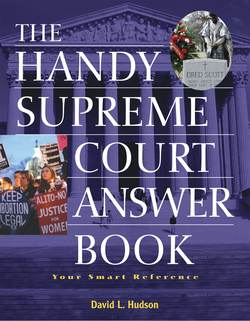Читать книгу The Handy Supreme Court Answer Book - David L Hudson - Страница 187
На сайте Литреса книга снята с продажи.
In what decision did the Court address direct and indirect taxes?
ОглавлениеThe Court unanimously ruled 3–0 in Hylton v. United States (1796) that Congress had the power to tax carriages without apportioning the taxes among the various states. Daniel Hylton was cited for not paying taxes on his 125 stipulated carriages. He contended that the tax was unconstitutional because Article II, Section 9, of the U.S. Constitution provides that no direct taxes “shall be laid, unless in Proportion to the Census or Enumeration herein before directed to be taken.” This provision means that direct taxes could not be imposed unless they were apportioned among the states based on population. Interestingly, at the Constitutional Convention of 1787, a delegate had asked for a definition of a direct tax and no one answered. This meant that the definition of a direct tax was unclear. The Supreme Court reasoned that the tax on carriages was an indirect tax not subject to the apportionment requirement. The Court reasoned that if a tax could not easily be apportioned among the states, then it was most likely an indirect tax. Because the Court held that a tax on carriages was not a direct tax, it concluded that the tax could be imposed lawfully.
CourtSpeak: Ware v. Hylton State Law vs. U.S. Treaty Case (1796)
Justice Samuel Chase (unanimous ruling): “It is the declared will of the people of the United States that every treaty made, by the authority of the United States, shall be superior to the Constitution and laws of any individual State; and their will alone is to decide. If a law of a State, contrary to a treaty, is not void, but voidable only by a repeal, or nullification by a State Legislature, this certain consequence follows, that the will of a small part of the United States may controul or defeat the will of the whole. The people of America have been pleased to declare, that all treaties made before the establishment of the National Constitution, or laws of any of the States, contrary to a treaty, shall be disregarded.”
Justice William Paterson: “No act of any state legislature, and no payment made under such act into the public coffers, shall obstruct the creditor in his course of recovery against his debtor. The act itself is a lawful impediment, and therefore is repealed; the payment under the act is also a lawful impediment, and therefore is made void.”
Justice James Wilson: “But even if Virginia had the power to confiscate, the treaty annuls the confiscation. The fourth article is well expressed to meet the very case: it is not confined to debts existing at the time of making the treaty; but is extended to debts heretofore contracted. It is impossible by any glossary, or argument, to make the words more perspicuous, more conclusive, than by a bare recital.”
Justice William Cushing: “A State may make what rules it pleases; and those rules must necessarily have place within itself. But here is a treaty, the supreme law, which overrules all State laws upon the subject, to all intents and purposes; and that makes the difference.”
